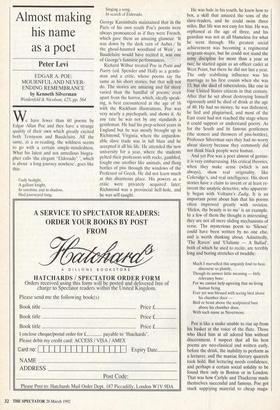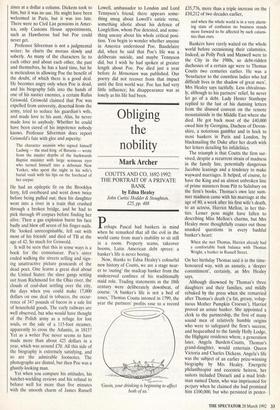Almost making his name as a poet
Peter Levi
EDGAR A. POE: MOURNFUL AND NEVER- ENDING REMEMBRANCE by Kenneth Silverman Weidenfeld & Nicolson, £25, pp. 564 Wc have fewer than 60 poems by Edgar Allan Poe and they have a strange quality of their own which greatly excited both Tennyson and Baudelaire. All the same, at a re-reading, the wildness seems to go with a certain simple-mindedness. What his latest and not untedious biogra- pher calls 'the elegant "Eldorado" ', which is about 'a long journey nowhere', goes like this:
Gaily bedight, A gallant knight, In sunshine and in shadow, Had journeyed long,
Singing a song,
In search of Eldorado.
George Katsimbalis maintained that in the Paris of his own youth Poe's poems were always pronounced as if they were French, which gave them an amazing glamour. 'It was down by the dark tarn of Auber,/ In the ghoul-haunted woodland of Weir', as Baudelaire would have recited it, was one of George's funniest performances.
Richard Wilbur treated Poe in Poets and Poetry (ed. Spender and Hall) as a gentle- man and a critic, whose poems say the same as his short stories, but that will not do. The stories are amazing and far more varied than the handful of poems; even apart from the horror, which, ideally speak- ing, is best encountered at the age of 16 with the Rackham illustrations, Poe was very nearly a psychopath, and shows it. At any rate he was not by any standards a gentleman. He had his prep-school years in England but he was mostly brought up in Richmond, Virginia, where the unpardon- able slave trade was in full blast and he accepted it all his life. He attended the new university for a year, where the students pelted their professors with rocks, gambled, fought one another like animals, and flung bottles of piss through the windows of the Professor of Greek. He did not learn much at this disastrous place. His powers as a critic were privately acquired later; Richmond was a provincial hell-hole, and he was self-taught. He was hale in his youth, he knew how to box, a skill that amazed the sons of the slave-traders, and he could swim three miles. But life was not easy for him. He was orphaned at the age of three, and his guardian was not at all blameless for what he went through. His greatest social achievement was becoming a regimental sergeant-major, but he could not stand the army discipline for more than a year or two; he started again as an officer cadet at West Point, but there he did not last a year. The only stabilising influence was his marriage to his first cousin when she was 13, but she died of tuberculosis, like one in four United States citizens in that century. After that he set about destroying himself vigorously until he died of drink at the age of 40. He had no money, he was dishonest, he lied and plagiarised, and most of the East coast had not reached the stage where it could support or understand poetry. As for the South and its famous gentlemen (the stoners and throwers of piss-bottles), Professor Silverman says they had no worry about slavery because they commonly did not think black people were human.
And yet Poe was a poet almost of genius: it is very embarrassing. His critical theories, when they make sense (which is not always), show real originality, like Coleridge's, and real intelligence. His short stories have a claim to invent or at least re- invent the analytic detective, who apparent- ly began with Voltaire's Zadig. It is an important point about him that his poems often improved greatly with revision. 'Helen, thy beauty is to me' is an example. In a few of them the thought is interesting; they are not all mere sliding mechanisms of verse. The mysterious poem to 'Silence' could have been written by no one else, and is worth thinking about. Admittedly, `The Raven and `Ulalume — A Ballad', both of which he used to recite, are terribly long and boring stretches of twaddle:
Much I marvelled this ungainly fowl to hear discourse so plainly, Though its answer little meaning — little relevancy bore: For we cannot help agreeing that no living human being Ever yet was blessed with seeing bird above his chamber door — Bird or beast above the sculptured bust above his chamber door, With such name as Nevermore.
Poe is like a snake unable to rise up from his basket at the voice of the flute. Those who liked him at all adored him without discernment. I suspect that all his best poems are neo-classical and written early, before the drink, the inability to perform as a lecturer, and the maniac literary quarrels took hold. But lecturing needs confidence, and perhaps a certain social solidity to be found then only in Boston or in London. That was how Carlyle and Thackeray made themselves successful and famous. Poe got stuck supplying material to cheap maga-
zines at a dollar a column. Dickens took to him, but it was no use. He might have been welcomed in Paris, but it was too late. There were no Civil List pensions in Amer- ica, only Customs House appointments, such as Hawthorne had but Poe could never get.
Professor Silverman is not a judgmental writer; he charts the morass slowly and soberly. As many of the characters lie to each other and about each other, the past and themselves, he has a hard time, but he is meticulous in allowing Poe the benefit of the doubt, of which there is a good deal. He becomes angry only when Poe is dead, and his biography falls into the hands of one of his nastier enemies, a certain Rufus Griswold. Griswold claimed that Poe was expelled from university, deserted from the army, tried to seduce his guardian's wife, and made love to his aunt. Alas, he never made love to anybody. Whether he could have been cured of his impotence nobody knows. Professor Silverman does report Griswold's fate with glee and asperity:
The character assassin who signed himself Ludwig — the mad king of Bavaria — wrote from the mazier depths of the backwoods Baptist minister with large sensuous eyes who turned himself into a debonair New Yorker, who spent the night in his wife's burial vault with his lips on the forehead of her corpse.
He had an epileptic fit on the Brooklyn ferry, fell overboard and went down twice before being pulled out; then his daughter went into a river in a train that crashed through a broken bridge, and he had to pick through 49 corpses before finding her alive. Then a gas explosion burnt his face badly and blew off seven of his finger-nails. He 'looked unrecognisable, fell out with most of his friends' and died of TB at the age of 42. So much for Griswold.
It will be seen that this in some ways is a book for the connoisseur. Poe's sister ended walking the streets selling and sign- ing unattractive picture postcards of the dead poet. One learns a great deal about the United States: the slave gangs setting out from Richmond for the Ohio river, the clouds of coal-dust settling over the city, the days when you could make 17,000 dollars on one deal in tobacco, the occur- rence of 347 pounds of bacon in a sale list of household goods. The early railways are well observed, but who would have thought of the Polish army as a refuge for lost souls, or the sale of a 115-foot steamer, apparently to cross the Atlantic, in 1815? Yet as a writer Poe never seems to have made more than about 425 dollars in a year, which was around £70. All this side of the biography is extremely satisfying, and so are the admirable footnotes. The photographs are dismal, but then Poe was a ghastly-looking man.
Yet when you compare his attitudes, his hatchet-wielding reviews and his refusal to behave well for more than five minutes with the smooth charm of James Russell Lowell, ambassador to London and Lord Tennyson's friend, there appears some- thing smug about Lowell's satiric verse, something idiotic about his defence of Longfellow, whom Poe detested, and some- thing uneasy about his whole critical posi- tion. You begin to wonder whether anyone in America understood Poe. Baudelaire did, when he said that Poe's life was a deliberate suicide, and maybe Tennyson did, but I wish he had spoken at greater length about Poe. Poe died just a year before In Memoriam was published. Our poetry did not recover from that impact until the first world war. Poe has had very little influence; his disappearance was as lonely as his life had been.



























































 Previous page
Previous page